#Kurt Masur
Explore tagged Tumblr posts
Text
youtube
Giovanni Battista Pergolesi (atribuido), «Gli tre cicisberi ridicoli: Tre giorni son che Nina in letto senesta». Pese a la atribución canónica, actualmente se le atribuye a Vicenzo Legrenzo Ciampi. Kurt Masur, director Elly Ameling, soprano
#giovanni battista pergolesi#vicenzo legrenzo ciampi#gli tre cicisberi#tre giorni son che nina#kurt masur#elly ameling
2 notes
·
View notes
Text
youtube
“Freude, schöner Götterfunken, Tochter aus Elysium, Wir betreten feuertrunken Himmlische, dein Heiligtum. Deine Zauber binden wieder, Was der Mode Schwert geteilt; Bettler werden Fürstenbrüder, Wo dein sanfter Flügel weilt.” (Friedrich Schiller)
Am 31.12.1918 dirigierte Arthur Nikisch in der damaligen Alberthalle des Kristallpalastes unweit des Hauptbahnhofes in Leipzig die Neunte Sinfonie von Ludwig van Beethoven. Das Konzert begann um 23 Uhr, damit exakt zum Jahreswechsel Friedrich Schillers “Ode an die Freude” erklingen konnte. Nach Beendigung des Ersten Weltkrieges sollte Beethovens und Schillers bewegende Friedensbotschaft die Menschen mit Hoffnung erfüllen.
Dies begründete eine Tradition, alljährlich am Silvesterabend Beethovens Neunte Sinfonie in Leipzig aufzuführen, die nach Beendigung des Zweiten Weltkriegs fortgesetzt wurde und seit 1978 im Fernsehen übertragen wird.
Es kann keine schönere Botschaft zu Beginn eines neuen Jahres geben als Schillers “Alle Menschen werden Brüder” in Beethovens unsterblicher Komposition.
Der Dirigent dieser Aufführung ist Gewandhauskapellmeister Professor Kurt Masur (1927 - 2015), der am 09.10.1989 das durch die Niederschlagung der friedlichen Demonstration in Leipzig befürchtete Blutbad durch sein couragiertes Handeln und durch den ganz persönlichen Einsatz seines immensen Renommees, der in der Verlesung des “Aufrufs der Leipziger Sechs” (“Wir bitten Sie dringend um Besonnenheit, damit der friedliche Dialog möglich wird.”) über den Leipziger Stadtfunk gipfelte, verhinderte.
#ludwig van beethoven#neunte sinfonie#leipzig#gewandhausorchester#kurt masur#sachsen#deutschland#silvester#tradition#ninth symphony#saxony#germany#new years eve
2 notes
·
View notes
Text
Happy birthday Kurt Masur
0 notes
Text
Kurt Masur is from my hometown 🇵🇱




Ansichtskarte
Filmbühne Capitol Leipzig Filmbühne Capitol Leipzig Größtes Filmtheater der DDR - Festivaltheater der alljährlich im November stattfindenden Internationalen Leipziger Dokumentar- und Kurzfilmwoche
DTVL (III/18/197 L 24/67)
36 notes
·
View notes
Text














THE THING (1982)
Director: John Carpenter Cinematography: Dean Cundey
#the thing#the thing 1982#the thing from another world#john carpenter#kurt russell#r.j. macready#keith david#wilford brimley#david clennon#richard masur#donald moffat#t.k. carter#bill lancaster#larry franco#sci fi horror#horror#horror movies#ennio morricone#80s#80s horror#80s sci fi#alien movies#cinematography#movie screencaps#movie screenshots#movie frames#film screencaps#film screenshots#film frames#screencaps
89 notes
·
View notes
Text
The Music Tastes of US Outpost #31
R. J. MacReady: CHICAGO BLUES


Childs: HARD ROCK


Blair: BAROQUE-ERA CLASSICAL


Palmer: 70'S PUNK


Windows: ACID ROCK


Nauls: FUNK


Clark: COUNTRY


Dr. Copper: TRAD POP


Fuchs: ROMANTIC-ERA CLASSICAL


George Bennings: BOSSA NOVA


Norris: OLDIES RADIO FORMAT


M.T. Garry: Doesn't listen to music

#the thing#the thing 1982#john carpenter#keith david#kurt russell#wilford brimley#david clennon#t.k. carter#donald moffat#richard masur#thomas g. waites#joel polis#peter maloney#charles hallahan#richard dysart#80s horror#horror#r.j. macready#i spent an embarrassing amount of time on this#so my music selections better be right.#music release dates may not match with character time of death
28 notes
·
View notes
Text
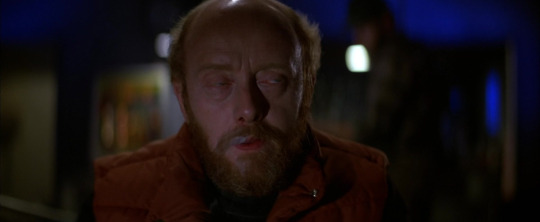





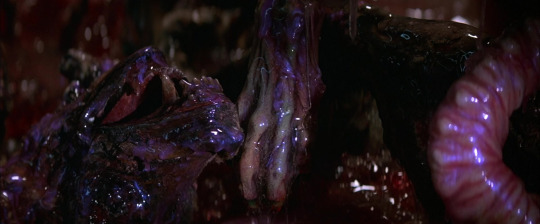
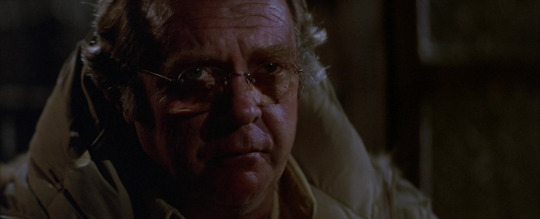

t h e t h i n g, 1982 🎬 dir. john carpenter
'Was that dog, the Norwegian dog?' - blair
'I just can't comprehend any of this. It was just a dog.' - garry
'tweren't no dog, Bwana.' - childs
#film#horror#the thing#the thing 1982#john carpenter#kurt russell#A Wilford Brimley#Peter Maloney#richard masur#Joel Polis#R.J. MacReady#as Blair#George Bennings#as Clark#as Fuchs#Absorption
11 notes
·
View notes
Text
This trailer idea has been knocking around my head for a couple years now, and now I have the means and skills to do so. I love The Thing to death, and while it's a paranoid, dread-inducing movie, it's also quite frequently a goofy one, and I wanted a trailer to reflect that beautiful paradox.
Made in Reaper
Film and song credits:
The Thing, dir. John Carpenter, 1982
"Superstition," Stevie Wonder, 1972
"Humanity, Pt. 2," Ennio Morricone, 1972
Freesound credits:
Ratachewy remix of strangehorizon's freesound #668381.flac by Timbre -- License Creative Commons 0
Squelching SFX [5] by SoundDesignForYou -- License: Creative Commons 0
walking and running through harsh snow 3 different speeds sound effect by Garuda1982 -- License: Attribution 4.0
Windy Window.wav by Pedaling Prince -- License: Attribution 3.0
A ruger 10/22LR rifle being shot further away w/ forest reverb by serøtōnin -- License: Creative Commons 0
#the thing#john carpenter's the thing#john carpenter#who goes there?#john w. campbell#rj maccready#kurt russell#wilford brimley#keith david#david clennon#thomas waites#donald moffat#t.k. carter#richard dysart#peter maloney#charles hallahan#joel polis#richard masur#stevie wonder#trailer#movie trailer#fan trailer#stevie wonder superstition#custom trailers#video editing#film edit#horror#sci fi#science fiction
3 notes
·
View notes
Text
youtube
THE THING (1982) Grade: B
Loved the script. The special effects haven't aged well, but doesn't distract from the plot and characters. Great ending as well.
#The Thing#1982#B#Horror Films#Thriller Films#John Carpenter#Aliens#Monster#Antarctica#Kurt Russell#Wilford Brimley#Keith David#Richard Masur#T.K. Carter#David Clennon#Charles Hallahan#Richard Dysart#Donald Moffat#Larry Franco#Joel Polis#Thomas G. Waites#Norbert Weisser#Adrienne Barbeau#Isolation#Youtube
1 note
·
View note
Text

Day 23 🎃:
The Thing (1982)
#horror#horror movies#spooky season#halloween#now watching#31 days of halloween#scifi#the thing#john carpenter#alien#kurt russell#Wilford Brimley#Keith David#Richard Masur#T.K. Carter#David Clennon#Charles Hallahan#Richard Dysart
1 note
·
View note
Text
Cult Faction Podcast Ep. 123: The Thing
In this weeks episode we turn our spotlight on the John Carpenter horror/sci-fi classic The Thing! https://cultfaction.com/wp-content/uploads/2024/08/ep23.mp3
#A. Wilford Brimley#Alien#Bill Lancaster#Charles Hallahan#David Clennon#Donald Moffat#Horror#Joel Polis#John Carpenter#John W. Campbell Jr#Keith David#Kurt Russell#Peter Maloney#Richard Dysart#Richard Masur#sci-fi#T.K. Carter#The Thing#Thomas G. Waites#Who Goes There?
0 notes
Text
The Mean Season (1985)
Directed by: Phillip Borsos Genre: Crime, thriller
CW: None
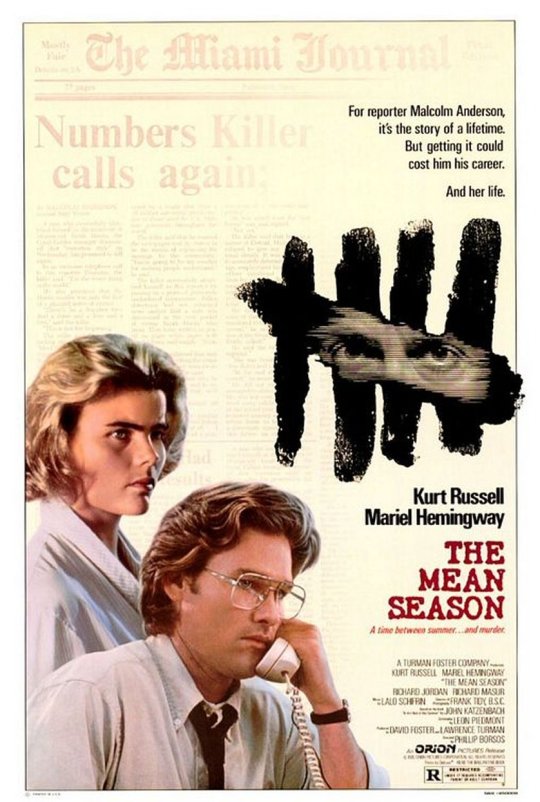

The Mean Season is a movie you've likely never seen personally (I mean especially in this day and age, good god) but you've definitely seen it somewhere else. Which is to say, you've probably seen a movie damn similar and likely better. What The Mean Season fails to give you in execution, it gives you in potential, which makes for a disappointing and rather lackluster watching experience.
So, to be transparent, I will admit right now that the reason I was watching this movie was entirely because it stars Kurt Russell. It also turns out I have already seen this film, which is not a promising revelation to have. You sort of want your thrilling crime drama to be memorable.
In any case the best way to illustrate the issues this movie has is to describe them in agonizing detail.
Kurt Russell plays Malcolm Anderson. He's a journalist who's feeling pretty burnt out by his job, but gets pulled into do one last big story when a serial killer who Malcolm recently reported on, contacts him about continuing to write about his future exploits.
So honestly, a promising start but I wouldn't call it groundbreaking. The dynamic is interesting though, and you can tell as the movie goes on that there was meant to be something more intriguing to their relationship.
See, the killer calls Malcolm after one of his murders so that Mal can get the scoop first. The killer likes his writing style, and in calling him, is giving him more veracity and also making the murders more sensational.
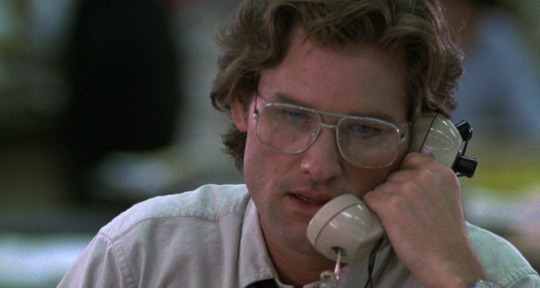
The killer's agenda, so far as we will ever understand, is to be the story. He gets mad later when more attention is on Malcolm's relationship to the case/killer later on in the film.
He also reportedly feels a certain sort of kinship with Malcolm, or feels as though Malcolm understands him and this is interesting in concept. Like obviously. The dichotomy between the killer and the journalist who writes for him is a great idea. Journalists in media have had a lot of varying stereotypes about them. At once they might be noble truth seekers, and then again, they are corruptible sensationalists who are motivated by a good story and nothing more. Think like Ace in the Hole (1951).
So it makes sense that a story would take advantage of those conflicting values.
Throughout the movie we get the impression that Malcolm's morals are supposed to be called into question. I mean characters do literally call them into question but it doesn't actually feel like anything about his character is really controversial or even slightly questionable.
His girlfriend, Christine (Mariel Hemingway), on a couple occasions talks as if he's becoming an entirely different person but we don't actually see any sort of transformation in his character so it makes her character feel weak as a result.
I should say now that acting wise, everyone does a good job. The issue isn't so much with any performance but with the story itself. It doesn't spend enough time exploring the character development of Malcolm and we don't really see his personal values get compromised.
Just that difference alone would have made this film significantly better than it is. The ending climax sees the killer, now known as Alan Delour (Richard Jordan), confronting Malcolm and accusing him of knowing him best. And even later Malcolm suggests that Alan can't kill him because who else gets him like he does?
And this scene falls flat because we keep getting told that something has happened with Malcolm, but we never see it. Despite the lack of character going on in the writing, Kurt Russell does a very good job playing a despondent man worried his girlfriend is dead. Of course, Kurt Russell is pretty good at this as Breakdown (1997) and Unlawful Entry (1992) will prove.


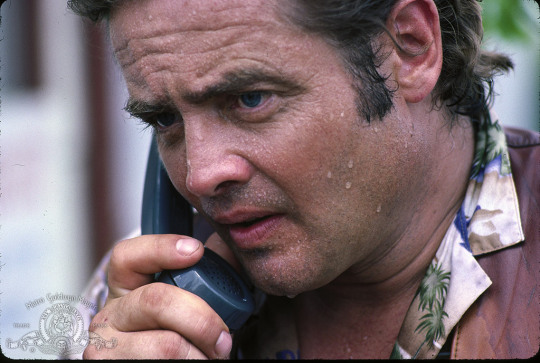
So all in all, is it worth watching? Uhhhhhhhhhhhh I mean it depends... If you're watching it so that you can see Kurt Russell- yes :) But also there are better movies with him in it playing a very similar character.
Do you just want to see a crime/mystery movie? Well, there are way more of those than there are Kurt Russell films so I won't say no, but there is less reason to see this if that's the case. It's not a horrible movie, but it's also not groundbreaking, and as I said before, you've likely seen a better version of this film already.
So given that, I'm feeling a 6/10.
#kurt russell#the mean season 1985#80s movie#mariel hemingway#andy garcía#richard jordan#richard masur
1 note
·
View note
Text
𝒪𝓀𝒶𝓎, 𝓉𝒽𝒾𝓈 𝓃𝑒𝓍𝓉 𝒻𝒾𝓁𝓂 𝒾𝓈 𝒷𝑒𝓎𝑜𝓃𝒹 𝑒𝓅𝒾𝒸 𝒻𝑜𝓇 𝓂𝑒, 𝓂𝓎 𝒻𝒶𝓂𝒾𝓁𝓎 𝒶𝓃𝒹 𝒶𝓁𝓁 𝓈𝒸𝒾-𝒻𝒾 𝒻𝒶𝓃𝒶𝓉𝒾𝒸𝓈. 𝒪𝓃𝓁𝓎 𝐉𝐨𝐡𝐧 𝐂𝐚𝐫𝐩𝐞𝐧𝐭𝐞𝐫 𝒸𝒶𝓃 𝓂𝒶𝓀𝑒 𝓎𝑜𝓊 𝓇𝑒𝒶𝓁𝓁𝓎 𝓉𝒽𝒾𝓃𝓀 𝒻𝓊𝓁𝓁𝓎 𝓌𝒾𝓉𝒽 𝓈𝓊𝓈𝓅𝑒𝓃𝓈𝑒 𝒶𝒷𝑜𝓊𝓉 𝒶𝓃 𝓊𝓃𝓀𝓃𝑜𝓌𝓃 𝒶𝓁𝒾𝑒𝓃 𝓁𝒾𝒻𝑒𝒻𝑜𝓇𝓂 𝒶𝓈𝓈𝓊𝓂𝒾𝓃𝑔 𝒸𝑜𝓃𝓉𝓇𝑜𝓁 𝑜𝒻 𝑒𝓋𝑒𝓇𝓎 𝓈𝒾𝓃𝑔𝓁𝑒 𝒷𝑒𝒾𝓃𝑔 𝒾𝓉 𝑒𝓃𝒸𝑜𝓊𝓃𝓉𝑒𝓇𝓈 𝑜𝓃 𝓉𝒽𝒾𝓈 𝓅𝓁𝒶𝓃𝑒𝓉. 𝒯𝒽𝒶𝓉'𝓈 𝓌𝒽𝓎 𝐓𝐡𝐞 𝐓𝐡𝐢𝐧𝐠 𝓉𝒶𝓀𝑒𝓈 𝒾𝓉'𝓈 𝓈𝓅𝑜𝓉 𝑜𝓃 𝓂𝓎 𝒻𝒶𝓋𝑜𝓇𝒾𝓉𝑒 𝓂𝑜𝓋𝒾𝑒 𝓁𝒾𝓈𝓉. 𝒰𝓃𝒷𝑒𝓁𝒾𝑒𝓋𝒶𝒷𝓁𝑒 𝒸𝒶𝓈𝓉 𝓌𝒽𝒾𝒸𝒽 𝓌𝒶𝓈 𝒹𝒾𝒻𝒻𝑒𝓇𝑒𝓃𝓉 𝒻𝓇𝑜𝓂 𝒶𝓁𝓁 𝑜𝓉𝒽𝑒𝓇 𝒸𝒶𝓈𝓉𝑒𝒹 𝓂𝑜𝓋𝒾𝑒𝓈 𝒷𝑒𝒸𝒶𝓊𝓈𝑒 𝒾𝓉 𝒸𝑜𝓃𝓈𝒾𝓈𝓉 𝑜𝒻 𝑜𝓁𝒹𝑒𝓇 𝓉𝑜 𝓂𝓊𝒸𝒽 𝓎𝑜𝓊𝓃𝑔𝑒𝓇 𝑔𝑒𝓃𝑒𝓉𝓁𝑒𝓂𝒶𝓃 𝓈𝓊𝒸𝒽 𝒶𝓈 𝓉𝒽𝑒 𝓁𝒶𝓉𝑒 𝐃𝐨𝐧𝐚𝐥𝐝 𝐌𝐨𝐟𝐟𝐚𝐭 𝒶𝓃𝒹 𝐓𝐡𝐨𝐦𝐚𝐬 𝐆. 𝐖𝐚𝐢𝐭𝐞𝐬, 𝓅𝓁𝓊𝓈 𝓉𝒽𝑒 𝒻𝒾𝓁𝓂 𝓁𝑜𝒸𝒶𝓉𝒾𝑜𝓃 𝒷𝑒𝒾𝓃𝑔 𝓈𝒾𝓉𝓊𝒶𝓉𝑒𝒹 𝒾𝓃 𝒜𝓃𝓉𝒶𝓇𝒸𝓉𝒾𝒸𝒶, 𝓉𝒽𝑒 𝓂𝑜𝓈𝓉 𝒾𝓈𝑜𝓁𝒶𝓉𝑒𝒹 𝓅𝓁𝒶𝒸𝑒 𝑜𝓃 ℰ𝒶𝓇𝓉𝒽. 𝒩𝑜, 𝓉𝒽𝑒 𝒻𝒾𝓁𝓂 𝓌𝒶𝓈𝓃'𝓉 𝒶𝒸𝓉𝓊𝒶𝓁𝓁𝓎 𝓇𝑒𝒸𝑜𝓇𝒹𝑒𝒹 𝒾𝓃 𝒜𝓃𝓉𝒶𝓇𝒸𝓉𝒾𝒸𝒶 𝒷𝓊𝓉 𝒾𝓉 𝒹𝑜𝑒𝓈 𝑔𝒾𝓋𝑒 𝓎𝑜𝓊 𝓉𝒽𝑒 𝒻𝑒𝑒𝓁𝒾𝓃𝑔 𝑜𝒻 𝒶𝒷𝒶𝓃𝒹𝑜𝓃𝓂𝑒𝓃𝓉. 𝒩𝑜𝓌 𝓉𝒽𝒾𝓈 𝒻𝒾𝓁𝓂 𝒾𝓈𝓃'𝓉 𝓉𝒽𝑒 𝒻𝒾𝓇𝓈𝓉 𝓋𝑒𝓇𝓈𝒾𝑜𝓃 𝑜𝒻 𝓉𝒽𝑒 𝓈𝒸𝒾-𝒻𝒾, 𝒶𝒸𝓉𝓊𝒶𝓁𝓁𝓎 𝒶𝓃𝑜𝓉𝒽𝑒𝓇 𝒻𝒾𝓁𝓂 𝒻𝓇𝑜𝓂 1951 𝓉𝒾𝓉𝓁𝑒𝒹 𝒶𝓈 𝐓𝐡𝐞 𝐓𝐡𝐢𝐧𝐠 𝐅𝐫𝐨𝐦 𝐀𝐧𝐨𝐭𝐡𝐞𝐫 𝐖𝐨𝐫𝐥𝐝 𝓌𝒶𝓈 𝓉𝒽𝑒 𝒻𝒾𝓇𝓈𝓉 𝓉𝑜 𝒷𝑒 𝓂𝒶𝒹𝑒 𝒶𝓃𝒹 𝐉𝐨𝐡𝐧 𝐂𝐚𝐫𝐩𝐞𝐧𝐭𝐞𝐫 𝓅𝓊𝓉 𝒽𝒾𝓈 𝑜𝓌𝓃 𝓈𝓅𝒾𝓃 𝑜𝓃 𝒾𝓉. ℐ'𝓋𝑒 𝓈𝑒𝑒𝓃 𝒷𝑜𝓉𝒽 𝓅𝒾𝒸𝓉𝓊𝓇𝑒𝓈 𝒶𝓃𝒹 𝓉𝒽𝑒𝓎'𝓇𝑒 𝒷𝑜𝓉𝒽 𝓈𝒸𝒾-𝒻𝒾/𝒽𝑜𝓇𝓇𝑜𝓇 𝒻𝒾𝓁𝓂𝓈 𝓅𝒶𝒸𝓀𝑒𝒹 𝒻𝓊𝓁𝓁 𝑜𝒻 𝓈𝓊𝓈𝓅𝑒𝓃𝒸𝑒. ℐ 𝓁𝑜𝓋𝑒 𝓉𝒽𝑒 𝑒𝒻𝒻𝑒𝒸𝓉𝓈 𝒾𝓃 𝓉𝒽𝒾𝓈 𝒻𝒾𝓁𝓂, 𝓉𝒽𝑒 𝓅𝓊𝓅𝓅𝑒𝓉𝑒𝑒𝓇𝒾𝓃𝑔 𝒶𝓃𝒹 𝒶𝓃𝒾𝓂𝒶𝓉𝓇𝑜𝓃𝒾𝒸𝓈 𝓌𝑒𝓇𝑒 𝒶𝒷𝓈𝑜𝓁𝓊𝓉𝑒𝓁𝓎 𝒶𝓂𝒶𝓏𝒾𝓃𝑔 𝒶𝓃𝒹 𝓉𝒽𝒾𝓈 𝒾𝓈 𝓌𝒽𝓎 ℐ'𝓂 𝓅𝓇𝑜𝓃𝑒 𝓂𝑜𝓇𝑒 𝓉𝑜𝓌𝒶𝓇𝒹𝓈 80'𝓈 𝒻𝒾𝓁𝓂𝓈 𝒷𝑒𝒸𝒶𝓊𝓈𝑒 𝓉𝒽𝑒 𝓇𝑒𝓂𝒶𝓀𝑒𝓈 𝓈𝓊𝒸𝒽 𝒶𝓈 𝓉𝒽𝑒 2011 𝓅𝓇𝑒𝓆𝓊𝑒𝓁 𝑜𝒻 𝐓𝐡𝐞 𝐓𝐡𝐢𝐧𝐠 𝑜𝓋𝑒𝓇𝒹𝒾𝒹 𝒾𝓉 𝓌𝒾𝓉𝒽 𝓉𝒽𝑒 𝐂𝐆𝐈. 𝒢𝒾𝓋𝑒 𝒾𝓉 𝒶 𝓉𝓇𝓎 𝒾𝒻 𝓎𝑜𝓊'𝓋𝑒 𝓃𝑒𝓋𝑒𝓇 𝓈𝑒𝑒𝓃 𝓉𝒽𝑒 1982 𝓋𝑒𝓇𝓈𝒾𝑜𝓃, 𝒶𝓃𝒹 𝒶𝓁𝓈𝑜 𝓉𝒽𝑒 1951 𝓋𝑒𝓇𝓈𝒾𝑜𝓃. 𝒯𝒽𝑒𝓎'𝓇𝑒 𝒹𝑒𝒻𝒾𝓃𝒾𝓉𝑒𝓁𝓎 𝓉𝓌𝑜 𝒻𝒾𝓁𝓂𝓈 𝓉𝑜 𝒷𝑒𝒽𝑜𝓁𝒹.
#The Thing (1982)#Horror/Sci-fi#Kurt Russell#Keith David#Wilford Brimley ✝︎#T. K. Carter#Richard Masur#David Clennon#Donald Moffat ✝︎#Thomas G. Waites#Larry Franco#Joel Polis#Richard Dysart ✝︎#Charles Hallahan ✝︎#Peter Maloney#Norbert Weisser#Clint Rowe
1 note
·
View note
Text
October 9, 1989: The day the dictatorial GDR regime broke
Throughout the 1980s, discontent among the population of the GDR about the economical and political situation kept growing. Nonetheless, the ruling party SED (Socialist Union Party of Germany) upheld its role as the only governing part of the state, continuing the process of the "socialist revolution" in the state. People started protesting against oppression of dissidents.
The situation became explosive after the rigged local elections on May 7, 1989. People didn't have the choice between multiple options. Instead, there was only one list of the "National Front", which was automatically counted as "yes" as soon as the ballot was dropped into the urn. The only way to vote "no" was to strike all entries in the list through with a straight line. Although this was a tedious proces that could easily be traced by the Stasi officers in the polling stations, many people made use of this way of voting "no". For the first time, citizens gathered in the polling stations to observe the process of counting. Althouth this was explicitly allowed by law (§ 37 of the voting act), access was denied in almost all cases. Nonetheless, members of the church documented electoral fraud and made it public. This led to the first protests, which the Stasi and regular police forced tried to quench. Around the same time, a mass exodus through neighboring countries to West Germany started.
These protests attracted more and more people. In many cases, the demonstrations started after peace prayers in the protestant churches throughout the country. But still, the oppressive system of the state held the upper hand. On October 7, 1989, the police forces, workers' militia, and Stasi arrested thousands of protesters in Leipzig and arrested them in horse stables on the grounds of the agricultural fair.
This led pastor Christoph Wonneberger to publish a plea for non-violence, which was agreed to by some SED secretaries read out loud over the city's public announcement system (by Leipzig's Gewandhaus Orchestra's conductor Kurt Masur) and during the peace prayers. On October 9, 1989, the situation was tense as approx. 130,000 people took to the streets, marching past the Stasi central. A massive presence of state forces was also present, and people feared a "Chinese solution", referring to the violent Tiananmen Square massacre earlier that year. However, the plea for non-violence by the power of its wording kept both protesters and state forces from violent actions and the protests ended peacefully and without any arrests.
This was the first time the GDR authorities gave in to the masses of protesters. The word spread, and protests sprang up in more and more cities throughout the country, leading to state leader Erich Honecker's demise on October 18 and culminated in the fall of the Berlin Wall on November 9, 1989, which ultimately led to the German reunification.
157 notes
·
View notes
Text

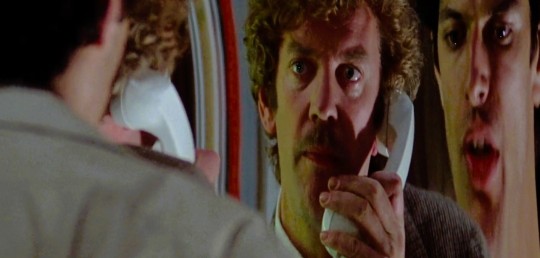
INVASION of the BODY SNATCHERS (1978) written by W.D. Richter (from the novel by Jack Finney) produced by Robert Solo directed by Philip Kaufman starring Donald Sutherland Brooke Adams Leonard Nimoy Jeff Goldblum Veronica Cartwright Art Hindle cinematography by Michael Chapman edited by Douglas Stewart music by Danny Zeitlin

JAWS (1975) written by Carl Gottlieb (from the novel by Peter Benchley) produced by Richard D. Zanuck and David Brown directed by Steven Spielberg starring Roy Scheider Robert Shaw Richard Dreyfus Lorraine Gary Murray Hamilton Carl Gottlieb cinematography by Bill Butler edited by Verna Fields music by John Williams
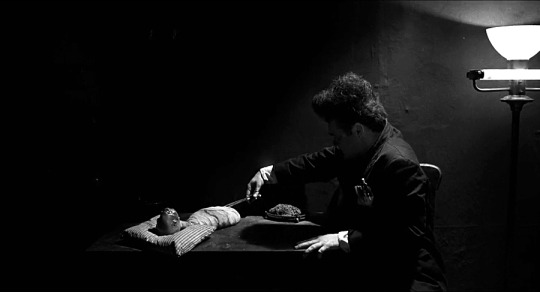
E r a s e r h e a d (1977) written, directed and produced by David Lynch starring Jack Nance Charlotte Stewart Allen Joseph Jeanne Bates Judith Roberts Laurel Near Jack Fisk cinematography by Frederick Elmes Herbert Caldwell edited by David Lynch sound design by Lynch w/ Alan Splet special effects by Lynch w/ Frederick Elmes
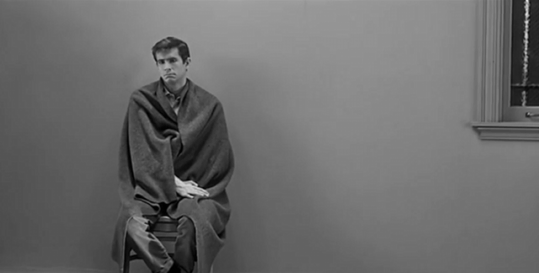
P s y c h o (1960) written by Joseph Stefano (from the novel by Robert Bloch) directed and produced by Alfred Hitchcock starring Anthony Perkins Vera Miles John Gavin Janet Leigh Martin Balsam Simon Oakland cinematography by John L. Russell edited by George Tomasini music by Bernard Hermann
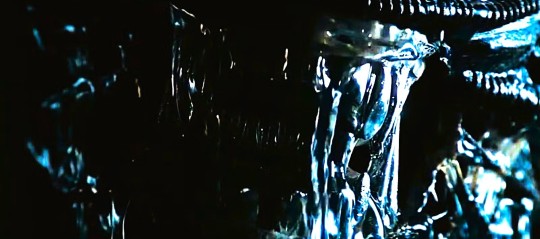
A L I E N (1979) written by Dan O'Bannon (story by Dan O'Bannon and Ronald Sushett) directed by Ridley Scott produced by Gordon Carroll David Giler Walter Hill starring Tom Skerritt Sigourney Weaver Veronica Cartwright John Hurt Harry Dean Stanton Yaphet Kotto Ian Holm cinematography by Derek Vanlint edited by Terry Rawlings music by Jerry Goldsmith
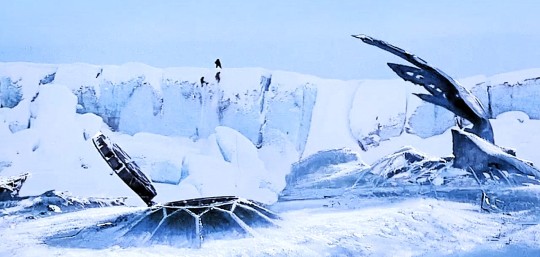
John Carpenter's The THING (1982) written by Bill Lancaster (from the novella "Who Goes There?" by John W. Campbell) directed by John Carpenter produced by David Foster Lawrence Turman Wilbur Stark starring Kurt Russell A. Wilford Briley T.K. Carter David Clennon Keith David Richard Dysart Charles Hallahan Peter Maloney Richard Masur Donald Moffat Joel Polis Thomas Waites cinematography by Dean Cundey edited by Todd Ramsay music by Ennio Morricone
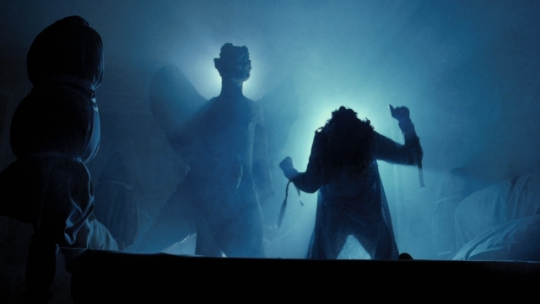
The Exorcist (1973) written by William Peter Blatty (from his novel) directed by William Friedkin produced by William Peter Blatty Noel Marshall David Salven starring Ellen Burstyn Max Von Sydow Jason Miller Lee J. Cobb Jack MacGowran Kitty Winn Mercedes McCambridge Linda Blair cinematography by Owen Roizman edited by Norman Gay Evan Lottman music by Jack Nitzche "Tubular Bells" by Mike Oldfield

R e p u l s i o n (1965) written by Roman Polanski Garard Brach screenplay adaptation by David Stone directed by Roman Polanski produced by Gene Gutowski starring Catherine Deneuve Ian Hendry John Fraser Peter Wymark Yvonne Furneaux cinematography by Gilbert Taylor edited by Alastair McIntyre music by Chico Hamilton
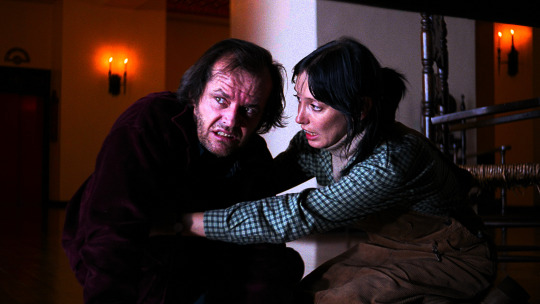
THE SHINING (1980) written by Diane Johnson Stanley Kubrick (from the novel by Stephen King) directed by Stanley Kubrick produced by Stanley Kubrick w/ Jan Harlan starring Jack Nicholson Shelley Duvall Danny Lloyd Scatman Crothers Barry Nelson Philip Stone Joe Turkel cinematography by John Alcott edited by Ray Lovejoy music by Wendy Carlos Rachel Elkind

Night of the Living Dead (1968) written by John Russo George A. Romero directed by George A. Romero produced by Karl Hardman Russell Streiner starring Duane Jones Judith O'Dea Karl Hardman Marilyn Eastman Keith Wayne Kyra Schon Judith Ridley cinematography by George A. Romero (uncr.) edited by George A. Romero (uncr.) Hugh Daly

Bram Stoker's Dracula (1992) written by James V. Hart (from the novel by Bram Stoker) directed by Francis Ford Coppola produced by Francis Ford Coppola Charles Mulvehill Fred Fuchs Michael Apted Robert O'Conner starring Gary Oldman Winona Ryder Anthony Hopkins Keanu Reeves Cary Elwes Richard E. Grant Billy Campbell Sadie Frost Monica Belluci Tom Waits cinematography by Michael Ballhaus edited by Anne Goursaud Glen Scantlebury Nicholas C. Smith music by Wojciech Kilar

TWIN PEAKS fire walk with me (1992) written by David Lynch Robert Engels (from the television series created by David Lynch and Mark Frost) directed by David Lynch produced by David Lynch Mark Frost Gregg Fienberg Johanna Ray John Wentworth starring Sheryl Lee Ray Wise Moira Kelly Grace Zabriskie Chris Isaak Kiefer Sutherland David Lynch Miguel Ferrer Harry Dean Stanton David Bowie Michael J. Anderson Frank Silva Al Strobel Jurgen Prochnow Dana Ashbrook James Marshall Frances Bay Catherine E. Coulson Kimberly Ann Cole Walter Olkewicz Lenny Von Dohlen Madchen Amick Peggy Lipton Julee Cruise Kyle Machlachlan cinematography by Ron Garcia edited by Mary Sweeney music by Angelo Badalamenti

Let the Right One In (2008) written by John Ajvide Lyndqvist (from his novel) directed by Tomas Alfredson produced by Frida Asp starring Kare Hedbrant Lina Leandersson Per Ragnar Henrik Dahl Ika Nord cinematography by Hoyte Van Hoytema edited by Tomas Alfredson Dino Jonsater music by Johan Soderqvist

W A R of the W O R L D S (2005) written by Josh Friedman David Koepp directed by Steven Spielberg produced by Kathleen Kennedy Damian Collier Paula Wagner Colin Wilson starring Tom Cruise Tim Robbins Dakota Fanning Miranda Otto Justin Chatwin Amy Ryan cinematography by Janusz Kaminski edited by Michael Kahn music by John Williams

Hannibal (2001) written by Steve Zaillian David Mamet directed by Ridley Scott produced by Martha De Laurentiis Dino De Laurentiis Ridley Scott starring Anthony Hopkins Julianne Moore Ray Liotta Gary Oldman Frankie Faison Giancarlo Giannini Francesca Neri Zeljko Ivanek Hazelle Goodman cinematography by John Mathieson editing by Pietro Scalia music by Hans Zimmer

The Hunger (1983) written by Ivan Davis Michael Thomas (from the novel by Whitley Strieber) directed by Tony Scott produced by Richard Shepherd starring Catherine Deneuve Susan Sarandon David Bowie Cliff De Young cinematography by Stephen Goldblatt edited by Pamela Power music by Michel Rubini Denny Jaeger

DON'T LOOK NOW (1973) written by Allan Scott Chris Bryant (based on the novella by Daphne Du Maurier) directed by Nicholas Roeg produced by Peter Katz starring Donald Sutherland Julie Christie Hilary Mason Clelia Matania Renato Scarpa cinematography by Anthony Richmond editing by Graeme Clifford music by Pino Donnagio

Prisoners (2013) written by Aaron Guzikowski directed by Denis Villeneuve produced by Broderick Johnson Kira Davis Andrew A. Kosove Adam Kolbrenner starring Jake Gylenhaal Hugh Jackman Maria Bello Viola Davis Melissa Leo Terrence Howard Paul Dano cinematography by Roger Deakins edited by Joel Cox Gary Roach music by Johann Johannsson

The Company of Wolves (1984) written by Neil Jordan Angela Carter (from the short story in Angela Carter's book "The Bloody Chamber and Other Stories") directed by Neil Jordan produced by Chris Brown Stephen Woolley starring Sarah Patterson David Warner Angela Lansbury Micha Bergese Stephen Rea cinematography by Bryan Loftus edited by Rodney Holland music by George Fenton

A Quiet Place (2018) written by Bryan Woods Scott Beck John Krasinski directed by John Krasinski produced by Michael Bay Andrew Form Brad Fuller starring Emily Blunt John Krasinski Millicent Simmonds Noah Jupe Cade Woodward cinematography by Charlotte Bruus Christensen edited by Christopher Tellefsen music by Marco Beltrami

W O R L D W A R Z (2013) written by Matthew Michael Carnahan Drew Goddard & Damon Lindelof (from the novel novel by Max Brooks) directed by Marc Forster produced by Brad Pitt Dede Gardner Jeremy Kleiner Ian Bryce starring Brad Pitt Mireille Enos Daniella Kertesz James Badge Dale Peter Capaldi Pierfrancesco Favino Ludi Boeken Matthew Fox Fana Mokoena David Morse cinematography by Ben Seresin edited by Roger Barton Matt Chesse music by Marco Beltrami

LOST H i g h w a y (1997) written by David Lynch Barry Gifford directed by David Lynch produced by Mary Sweeney Tom Sternberg Deepak Nayar starring Bill Pullman Patricia Arquette Balthazar Getty Natasha Gregson Wagner Robert Loggia Robert Blake Michael Massee Jack Nance Henry Rollins Gary Busey cinematography by Peter Deming edited by Mary Sweeney music by Angelo Badalamenti

N e a r D a r k (1987) written by Kathryn Bigelow Eric Red directed by Kathryn Bigelow produced by Edward S. Feldman Steven-Charles Jaffe Charles Meeker starring Adrian Pasdar Jenny Wright Lance Henriksen Bill Paxton Jenette Goldstein Tim Thomerson cinematography by Adam Greenberg edited by Howard Smith music by Tangerine Dream
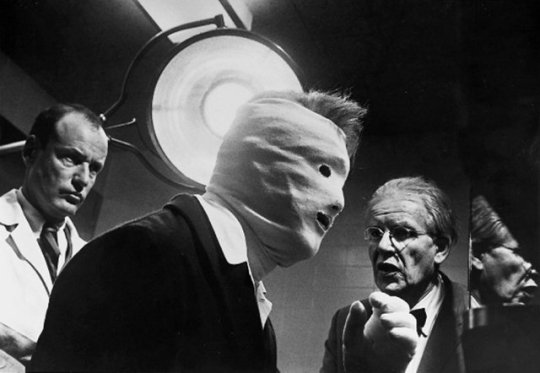
S e c o n d s (1966) written by Lewis John Carlino (from the novel by David Ely) directed by John Frankenheimer produced by John Frankenheimer Edward Lewis starring Rock Hudson Salome Jens John Randolph Will Geer Jeff Corey Murray Hamilton Frances Reid cinemtography by Tak Fujimoto edited by David Newhouse Ferris Webster music by Jerry Goldsmith

Nosferatu The Vampyre (1979) written by Werner Herzog w/ Tom Shachtman Martje Grohmann directed by Werner Herzog produced by Walter Saxer Werner Herzog Michael Gruskoff starring Klaus Kinski Isabelle Adjani Bruno Ganz Roland Topor Walter Landengast Martje Grohmann cinematography by Jorg Schmidt-Reitwein edited by Beate Mainka-Jellinghaus music by Florian Fricke Popol Vuh
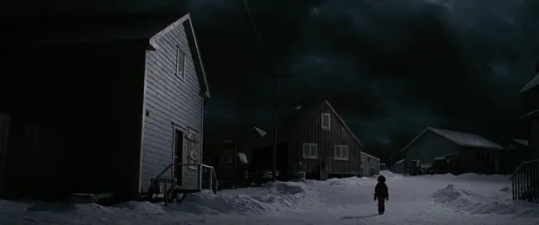
30 DAYS of NIGHT (2007) written by Steve Niles Stuart Beattie Brian Nelson (from the graphic novel by Steve Niles Ben Templesmith) directed by David Slade produced by Sam Raimi Robert Tapert starring Josh Hartnett Melissa George Danny Huston Ben Foster Mark Boone Jr. Amber Sainsbury Megan Franich Manu Bennett cinematography by Jo Willems edited by Art Jones music by Brian Reitzell

f r e a k s (1932) written by Willis Goldbleck Leon Gordon (from the short story "Spurs" by Tod Robbins) directed and produced by Tod Browning starring Wallace Ford Leila Hyams Olga Baclanova Roscoe Ates cinematography by Merritt B. Gerstad edited by Basil Wrangell
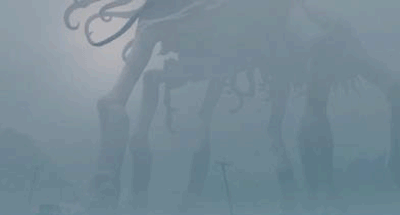
the M i s t (2007) written and directed by Frank Darabont (from the novella by Stephen King) produced by Frank Darabont Martin Shefer Liz Glotzer starring Thomas Jane Laurie Holden Marcia Gay Hardin Andre Braugher Toby Jones William Sadler Frances Sternhagen Jeffrey DeMunn cinematography by Rohn Schmidt edited by Hunter M. Via music by Mark Isham

Invasion of the BODY SNATCHERS (1956) written by Daniel Mainwaring (from the novel by Jack Finney) directed by Don Siegel produced by Walter Wanger starring Kevin McCarthy Dana Wynter Larry Gates King Donovan Carolyn Jones Jean Willes Ralph Dumke cinematography by Ellsworth Fredericks edited by Robert S. Eisen music by Carmen Dragon
3 notes
·
View notes
Note
Do you think the thing from the hit movie John carpenters: the thing would wear socks? If so where?
The Thing is a 1982 American science fiction horror film directed by John Carpenter from a screenplay by Bill Lancaster. Based on the 1938 John W. Campbell Jr. novella Who Goes There?, it tells the story of a group of American researchers in Antarctica who encounter the eponymous "Thing", an extraterrestrial life-form that assimilates, then imitates, other organisms. The group is overcome by paranoia and conflict as they learn that they can no longer trust each other and that any of them could be the Thing. The film stars Kurt Russell as the team's helicopter pilot R.J. MacReady, with A. Wilford Brimley, T. K. Carter, David Clennon, Keith David, Richard Dysart, Charles Hallahan, Peter Maloney, Richard Masur, Donald Moffat, Joel Polis, and Thomas G. Waites in supporting roles.
Also put your socks on your feet.
3 notes
·
View notes